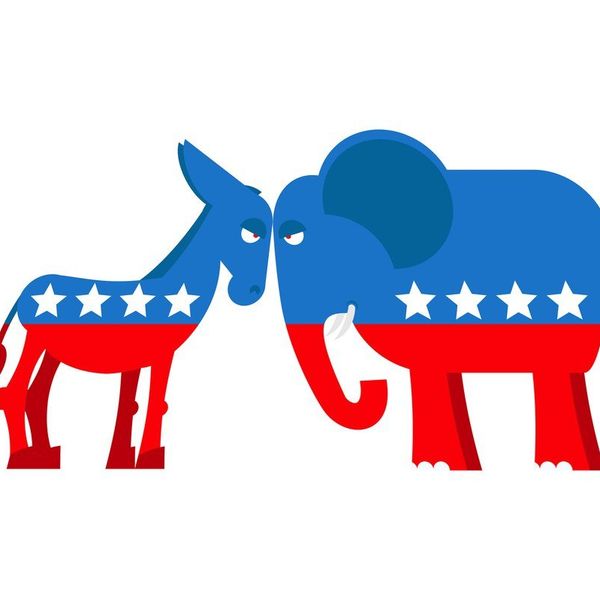It does not take a polisci major or a history background to know that the United States was not founded on political parties. Unlike the Westminster model, our Madisonian democracy does not require or rely on party affiliations to function. As many are aware, George Washington actually warned against politicians becoming ensnared in the traps of political parties. But we have strayed significantly from the vision our predominant founding father had for our nation, and with that straying we have become far too reliant on these unnecessary institutions.
I’m a huge party person. I am wholeheartedly devoted to the Republican Party. My freshman year of high school, our government and civics teacher made everyone in the class take a survey to see how we lined up with party platforms. There were one hundred questions. The purpose of the exercise was to show us that most young people are fairly independent and freethinking and that they do not particularly align with one party over another. I answered all one hundred questions with the Republican answers. Even so, I understand that political parties have morphed into something they should never be.
Politicians have reached a point where they have forgotten that their first allegiance is to the United States of America, its citizens and producing results. Their party affiliation should come second to all of those things.
We have succumbed to a culture that barrages us with the incorrect notion that political discourse precluding results is normal and acceptable. We have also succumbed to the erroneous belief that political parties are a glorious cause in the name of which we must fight valiantly. We have accepted the poisonous notion that the parties can never agree or work together. All of this is a virtual slap in the fact to democracy and freethinking.
I fully understand that there are certain beliefs and ideas that are so intrinsic and central to a party’s platform that they must never be compromised or conceded, but those principles are limited. Too often our political parties get bogged down in insignificant squabbling and fail to do their most basic job: serve the people. Both parties need to come to the realization that compromise is the very essence of democracy. Only through healthy discourse can we grow and strengthen as a nation. Opposing viewpoints are not only strengthening, though. They are essential.
I once had a friend sum it up quite eloquently. “Sameness is boring; more than that, it’s unrealistic,” she said. We are not all going to agree on every issue. There would be no point in having a government if everyone unequivocally agreed. But we should never let our disagreements overshadow democracy itself.
My favorite example of healthy discourse and disagreement will always be Ruth Bader Ginsburg and Antonin Scalia. The de facto leaders of the liberal and conservative factions of the Supreme Court, respectively, the two stalwarts and legal giants enjoyed a long and rewarding friendship. They understood how imperative it was to have opposing viewpoints represented and heard, and they both agreed that having the other made them each better. They thought, wrote and performed their constitutional duties better because they had each other to verbally spar against. They respected each other and had great affection for one another. They never let their opposing political ideologies interfere with their personal friendship. We as a nation should look to them as an example to which we should aspire.
This election has been full of harsh rhetoric, intense fear mongering and very little substance. This election is a direct result of the toxic divisions we have given into as a nation. We have got to forsake the belief that we are right and that it is not worth listening to the other side. We are never going to have an entirely Republican or an entirely Democratic government. We have to learn to work together and accomplish our desired goals as best we can while promoting free thinking and independence.
I was privileged to attend Melania Trump’s first major campaign speech since the RNC last week. Win or lose, Mrs. Trump said something I will never forget. It was an ideal I will continue to fight for long after this election is over. She said, “We in this nation have got to change how we communicate with each other, and we have to change how we disagree with each other.”
Disagreement does not automatically have to beget derision. Discourse does not have to mean division. In her entire speech, Melania Trump never once insulted Hillary Clinton or slung any mud at the Democratic campaign. She lost no resonance or response because of her omission of insults. In fact, it was the first speech I have heard in nearly two years where I truly felt invigorated and inspired afterwards.
I understand that each side of the ideological divide is convinced that they are completely correct. I am in no way telling anyone that they are inherently wrong in their beliefs. I am merely requesting that the next time you ardently disagree with someone politically, try to see things from their perspective. Climb in their skin and walk around in it. Take a page from RBG and Scalia and go to the opera together. Get to know them. Learn to respect them. Find out precisely why they think the way they do. I am not saying you should compromise your own beliefs in the process, but you will never feel worse after expanding your thinking and learning more. Who knows? You might get a best friend out of it. Maybe you make a difference in someone’s life and change their thinking. Maybe you change your own. Worst case scenario, you grow as a person, as a citizen and as a participant in democracy.
























